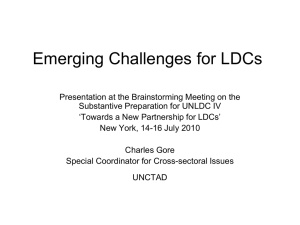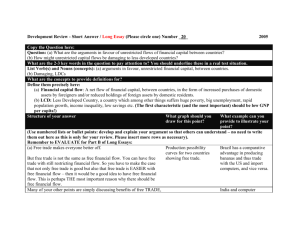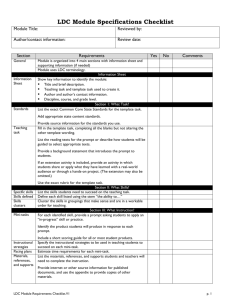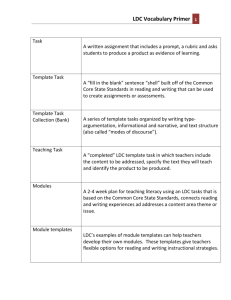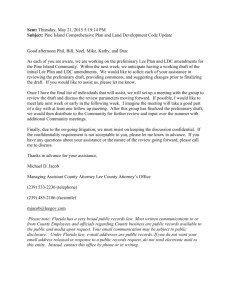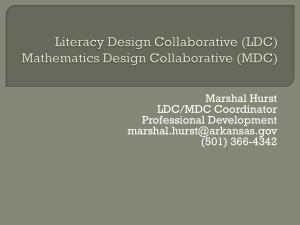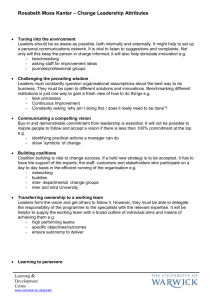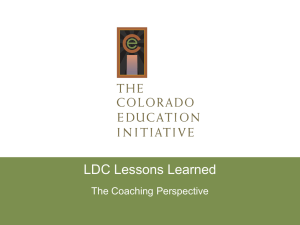word - ReStore
advertisement
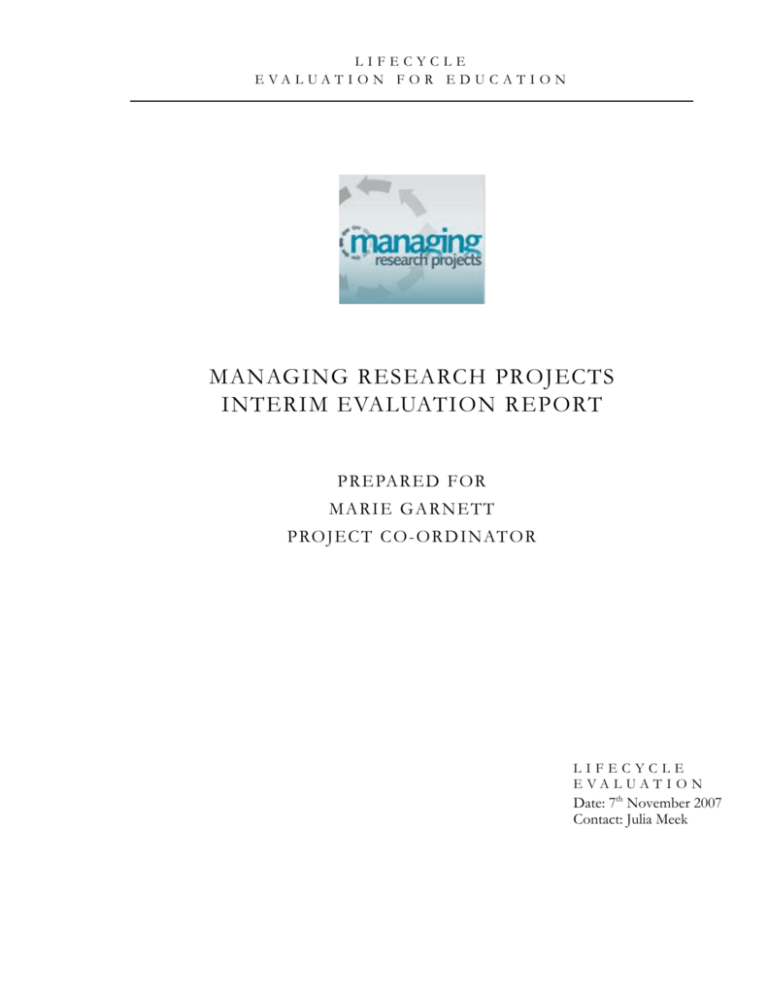
LIFECYCLE E VA L UAT I O N F O R E D U C A T I O N MANAGING RESEARCH PROJECTS INTERIM EVALUATION R EPORT P RE PARE D F OR M A RI E GA RNE T T P RO J E C T C O - OR D IN AT OR LIFECYCLE E VA L UAT I O N Date: 7th November 2007 Contact: Julia Meek TABLE OF CONTENTS 1. Introduction ................................................... 3 2. Research Methodology.................................. 3 2.1 Questionnaire ............................................... 4 3. Data analysis ................................................... 5 3.1 Background information ............................ 5 3.2 Task Allocation ............................................ 8 3.3 Communication ......................................... 10 3.4 Decision Making ........................................ 11 3.5 Collaboration.............................................. 13 6. Conclusions .................................................. 15 7. Recommendations ....................................... 15 2 MANAGING RESEARCH PROJECTS INTERIM EVALUATOR RE PORT 1. INTRODUCTION The Managing Research Projects proposal outlined that: “A small-scale external evaluation of the project will be commissioned at the end of Year 2 of the project. The aim of the evaluation will be to harvest the Managing Research Projects (MRP) project team's experience of project management and working collaboratively. This will be fed back into the development of the guidance materials”. The evaluation has been undertaken. Feedback from the project team was obtained through a questionnaire distributed via email. The objective of this report is to present the MRP team’s experience of project management and working collaboratively, based on the findings that have emerged from the returned questionnaires. 2. RESEARCH METHODOLOGY This was a small external evaluation with a clear aim of collecting evidence of the project team’s experience of project management and working collaboratively on the MRP project. A questionnaire was sent as an email attachment to the twelve members of the MRP team presented in alphabetical order below: Ruth Ayres (LDC) Sue Bennett (LDC) Paul Blackmore (Coventry University) Alan Brown (Institute of Employment Research) Mark Childs (LDC) Marie Garnett (LDC) Kate Hughes (Research Support Services) Gillian Hundt (School of Health and Social Studies) Sue Law (Coventry University) Robert Lindley (Institute of Employment Research) Geoff Lindsay (Centre for Educational Development, Appraisal and Research) Nikki Muckle (Research Support Services) It was made clear at the start of the evaluation that all responses would be anonymous. The twelve members of the MRP team were contacted in June 2007; the final completed 3 questionnaire was received in October 2007. Eight members of the team completed and returned their questionnaires, two were unable to complete the questionnaire due to other work commitments, and no feedback was obtained from the remaining two members of the MRP team. This report is based on data from the eight completed questionnaires. 2.1 QUESTIONNAIRE The questionnaire was designed around the key issues for project working and collaboration, identified in the interviews with P.I.s that were carried out by the MRP team. The questionnaire collected some basic background information about each respondent e.g., project management experience and time allocated to the project. The main body of the questionnaire focused on the management and collaboration within the project e.g. Project Roles, Task Allocation, Communication, Decision Making and Collaboration. The MRP team members were asked to describe how each of these activities had been approached within the project and to give their opinion on what was effective, what was not so effective and what developments could be made to improve project management and collaboration within the team. 4 3. DATA ANALY SIS 3.1 BACKGROUND INFORMATION The eight members of the team who responded to the questionnaire have a broad range of project management experience, working on departmental, institutional, inter-institutional and international projects. Respondents were asked to classify themselves as early, mid or established career researchers, the results are presented in Figure 1. Project Management Experience 5 4 3 2 1 0 Early (0 to 7 years) Mid (8 to 14 years) Established (>14 years) Blank Figure 1: Project Management Experience Respondents were asked to indicate the amount of time they were allocated to spend on the MRP project. Three of the respondents reported a time allocation of less than 5%, three respondents spend between 5% and 10% of their time and only one respondent spends up to 15% of their time on the project. Percentage of time spent on the project 4 3 2 1 0 Less than 5% 5% to 10% 10% to 15% 15% to 20% Figure 2: Percentage of time spent on the project 5 Blank The respondents provided information on their role within the project, the categories were: Advisory role, Management role, Dissemination role and Research role. One respondent opted to leave all the categories blank and others either selected one role or several roles. Figure 3 illustrates the roles that were specified. Role within the project Advisory role Management role Dissemination role Research role Figure 3: Role in the project The information respondents provided on the amount of time they spend on the project coupled with additional information they provided on their role within the project illustrated that there are two key groups working on the project; the LDC Team and the Full Group. The LDC Team and the Full Group take on distinct roles within the project. The LDC Team undertake the day to day research (reporting to the PI), the Full Group contribute to the project through team meetings. Full Group PI LDC Team Figure 4 MRP Project structure When considering the data gathered from respondents on the project management and collaboration within the MRP project a distinction between these groups emerges. This 6 distinction between the groups is reflected in the way the data has been presented in this report. A third grouping has also been included the; ‘Social Science Community’, this group was mentioned by several respondents particularly in response to the questions on ‘Communication’. 7 3.2 TASK ALLOCATION 3.2.1 Task allocation LDC Team Task allocation within the LDC Team is discussed and agreed at monthly team meetings. Members of the team volunteer or are asked to take on specific research tasks, which they initially discuss and agree as a team. Progress on the task is discussed at the next meeting. Generally as a team they feel this works well. The research and data analysis for the MRP project is undertaken by the small number of people (LDC Team).The LDC Team members have limited time allocated to the MRP Project, an identified conseuqence of this is that tasks are taken up and put down and can take longer to complete. Due to time constraints tasks may be dropped or other members of the LDC Team may be required to take up the task, which can lead to a longer completion time. Recommendations for Task Allocation in the LDC Team Enusre clarity on levels of input and responsibility that each team member has for each task Ensure that tasks are shared equally between team members in relation to the time they have allocated to the project Give tasks a shorter time frame, with clear outcomes 3.2.2 Task allocation Full Group There needs to be clarification over the role of the Full Group. The feedback from respondents varied, some see the Full Group as having an advisory role others see the group having a hands-on role in the research. One respondent observed that some members of the Full Group expressed an interest in being more closely involved in the day to day research, working on the data analysis. However, this has not been possible due to the other work commitments of the members of the Full Group. The Full Group provide advice which is described as helpful; however they also allocate tasks to the LDC Team. As the Full Group are not involved hands on in the day to day running of the research their allocation of tasks is described, at times, as causing logistical problems leading to delays in completing tasks. The responses illustrate that the uncertainty over the role of the Full Group causes tensions within the MRP project team. Some members of the Full Group expressed uncertainty over their role in the project. Some members of the LDC Team expressed frustration that the Full Group are not very supportive at meetings, are sometimes critical of the LDC Team’s work and allocate tasks when they are not familiar with the day to day issues of the research. Several respondents mentioned that the composition of the LDC Team and, to a lesser extent, that of the Full Group, has changed significantly since the original bid for funding was written. This has led to the re-configuration of the project team to take account of changes. 8 Recommendations for Task Allocation in the Full Group Clarify the role of the Full group. If the role of the Full Group is ‘advisory’ the group should provide guidance and advice. If the role is ‘hands-on’, members of the group need to make time to work with the LDC Team on the research Try to promote a collaborative and supportive wider working group 3.2.3 Social Science Community In addition to the Full Group there is the broader social science community at Warwick; and beyond. One respondent expressed a concern that too few people at Warwick had been involved, which has led to less co-operation with the project from the social science community at Warwick. The respondent did not provide details of what aspects of the project could have involved more representatives from the social science community at Warwick. However, this is an issue that has been raised as an area of concern and should be discussed by the Full Group. Recommendations for involving the wider Social Science Community Discuss how to engage the social science community at Warwick and beyond with the project Information on the MRP project is disseminated more widely to the social science community at Warwick and beyond (this may already be a feature of the next phase of the project) 9 3.3 COMMUNICATION 3.3.1 Communication LDC Team The methods of communication used by the LDC Team are monthly meetings, email, sharing of documents, one-to-one discussions. Respondetns agreed that these methods work well. However, it was highlighted that disucssion via email can be time consuming. If a member of the team does not pick up a key email, then a lot of time can be spent working out the thread of the dicussion in order to be able to contribute. Recommendation for LDC Team Communication Use email for brief information points, save discussions for face-to-face meetings 3.3.2 Communication Full Group The Full Group hold one facetoface meeting per term. Respondents described these meetings as useful, as they provide an overview of progress. However, Full Group meetings were described as inappropriate for the ‘micro management’ of the project. The issue of the Full Group allocating tasks to the LDCTeam has been described (section 3.2).The PI is aware of this and has set up management meetings between himself and the key representatives from LDC Team once a term. Face to face meetings were described as an effective way to explore and discuss ideas for both the LDC Team and the Full Group. However, one respondent noted that formal meetings do not work as a way of genuinely keeping people involved and committed. Formal meetings appear to be the main method of communicating with the Full Group and communication with the Full Group between meetings appears to be limited. Recommendations for Full Group Communication Use Full Group meetings to discuss ideas, rather than allocating tasks More regular communication with the full group (regular updates) a private section of the website for an MRP team blog 3.3.3 Social Science Community The main communication with the wider social science community has focused on the ‘Launch’ which several respondents highlight as a very successful event. The website is a source of information about the project for the wider social science community. A Forum discussion group has been set up to enable wider participation, however there has been very little response from the wider community to the discussion seeds that have been posted. 10 Recommendation for Communication with the Social Science Community Promote the web based discussion Forum by inviting PI’s who have been involved in the research to contribute to the discussion Forum There needs to be up-date bulletins on progress for the wider community, these could appear on the project website Information on the MRP project is disseminated more widely to the social science community at Warwick and beyond (this may already be a feature of the next phase of the project) 11 3.4 DECISION MAKING Two key areas of decision making emerged from the data, administrative decisions and research decisions. 3.4.1 Administrative decisions Administrative decisions are made by the Project Co-ordinator, communicated to the LDC Team and, where appropriate, to the Full Group. 3.4.2 Research decisions Research decisions are made in the LDC Team meetings and take account of advice given by the PI. The decisions are communicated to the Full Group via the Full Group meeting. Several respondents highlighted that the desicion making process can be slow when waiting for input from the Full Group. The LDC Team have undertaken the research interviews and data analysis. They have worked through a process of brainstorming followed by consolidation. Each team member has taken responsibility for a section of the data and undertaken the data analysis. The team then come back together to discuss the results. The team outline that this process has worked well. Uncertainty over the role of the Full Group emerges again in relation to decision making. The data indicates that the day-to-day research is being undertaken by the LDC Team and that the Full Group act in an advisory role. However, there appears to be confusion over the role of the Full Group in making research decisions. When the Full Group are involved in decisions, wating for their feedback can slow down progress. The PI is aware of the uncertainty of roles surrounding decision making and has set up management meetings between himself and the key representatives from LDC (once a term). He has also set up one-to-one meetings with the Project Co-ordinator to get direct feedback on the research and to co-ordinate research decisions. Recommendations There has to be clarification on the role of the Full Group. If they are to be involved in research decisions options should be presented at the Full Group meetings. With the Full Group making a collective decision at that meeting, so that awaiting decisions does not slow down progress. 12 3.5 COLLABORATION 3.5.1 LDC Team Collaboration The LDC Team describe how they have worked well collaboratively, especially on the analysis of nodes although they reported working less well on the preparation for the regional seminars. 3.5.2 Full Group Collaboration The question on collaboration once again indicates that there has been confusion over the role of the Full Group. Members of the Full Group have wanted to become more involved with the day to day research, however don’t appear to have any direct time available. There needs to be clear definition of the role of the Full Group. Respondents were asked to indicate how well the MRP team worked together (Very well, OK, Not very well), Figure 5 illustrates the responses, (one respondent opted to check two of the catagories) Overall, how does the MRP team work together 5 4 3 2 1 0 Very well OK Not very well Figure 5: How does the MRP team work together Recommendations for future Collaboration Respondents were asked to make recommendations on how the MRP team should collaborate in the future. One respondent recommends that all MRP team members are aware of their responsibilites and the responsibilites of others in the team and are aware of how tasks fit together and fit in with the project as a whole 13 Another respondent suggests annual review activities to discuss how the team have worked together and capture effective and not so effective practices to possibly use as data in the project A clearer definition of the role of the Full Group has been mentioned throughout this report and it is important that this issue is addressed for the future collaboration of the group 14 6. CONCLUSIONS The data clearly highlights that there are two groups working together on the MRP project. The LDC Team, who are undertaking the day to day research and the Full Group who meet once a term. There is confusion over the role of the Full Group some see it as providing advice and others as having hands on involvement in the research. The key issue that emerges from the data is that the role of the Full Group has to be clarified. The LDC Team is a small group; the methods they use for task allocation and communication are considered by the members of the team to work well and reflect the size of the group. The Full Group is a larger more diverse group drawn from across the University, more formal methods of communication reflect the size of the Full Group. The formal face to face meetings are an effective way of keeping the Full Group updated on the project and an effective mechanism for the Full Group to provide general guidance and advice. However, face to face meetings that only occur once a term are not an effective way for tasks to be allocated and prompt decisions on research issues to be reached. The full MRP Team incorporating the LDC Team and Full Group has a vast amount of project management experience. The data collected from the MRP Team has illustrated areas where the project management and collaboration have worked well and areas that could be improved. The complete list of recommendations presented in the report is listed in Section 7. 7. RECOMMENDATIONS The complete list of recommendations is presented below for discussion by the Full Group. R1 LDC Team –Ensure clarity on levels of input and responsibility that each team member has for each task R2 LDC Team - Ensure that tasks are shared equally between team members in relation to the time they have allocated to the project R3 LDC Team - Give tasks a shorter time frame, with clear outcomes R4 Full Group - Clarify the role of the Full group. If the role of the Full Group is ‘advisory’ the group should provide guidance and advice. If the role is ‘hands-on’, members of the group need to make time to work with the LDC Team on the research R5 – Full Group - Try to promote a collaborative and supportive wider working group R6 - Discuss how to engage the Social Science Community at Warwick and beyond with the project 15 R7 - Information on the MRP project is disseminated more widely to the social science community at Warwick and beyond (this may already be a feature of the next phase of the project) R 8 LDC Team - Use email for brief information points, save discussions for face-to-face meetings R9 Full Group - Use Full Group meetings to discuss ideas, rather than allocating tasks R10 - There has to be clarification on the role of the Full Group. If they are to be involved in research decisions options should be presented at the Full Group face to face meetings. With the Full Group making a collective decision at that meeting so that awaiting decisions does not slow down progress R11 Full Group - More regular communication with the Full Group (regular updates) a private section of the website for an MRP team blog R 12 Promote the web based disucssion Forum by inviting PI’s who have been involved in the research to contribute to the Forum 16
